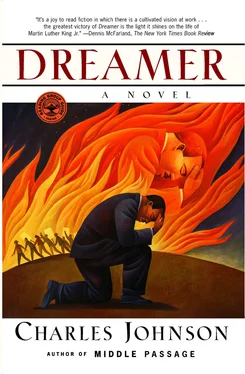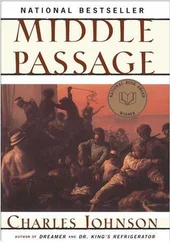Then, just two days before C-Day, the mayor blinked, calling for a meeting in the Monroe Room of the Palmer House, where with King he presided over a conference that in effect conceded that his city had not done enough. The meeting lasted ten hours. It included members of the Chicago Real Estate Board, the Housing Authority, and the SCLC, other black activists, Archbishop John Cody, and business leaders. Promises were made to promote fair housing practices and enforce them, encourage legislation, and make colorblind bank loans to qualified families. The Summit Agreement, though not wholly satisfactory to King (it had no guarantees, no schedule, nothing but good intentions), was nonetheless broader in boons won for the black poor than anything he’d achieved in the South, and so he delayed the march into Cicero. Later, at a church on the West Side, he admitted, “Morally, we ought to have what we say in the slogan, Freedom Now. But it doesn’t all come now. That’s a sad fact of life you will have to live with.”
Some, like members of SNCC and Robert Lucas of CORE, refused to live with that. They couldn’t wait, they said. To their eyes, the Summit Agreement was a sellout, an emergency exit King used to parachute out of his promise to end slum dwelling in Chicago. Many proclaimed they were tired of being led by middle-class Negroes and rejected the Agreement terms. A new black cat was on the scene, they said, represented by the fierce black masculinity of Stokely, who told it like it was — and by ex-cons in the Black Panther Party. Without King’s endorsement, CORE plunged two hundred strong into Cicero in early September, protected by a couple of thousand National Guardsmen. The violence rivaled that of the Marquette march, forcing the marchers to fall back to Lawndale.
After issuing a warning that if the Agreement was not implemented he would renew his agitation, the minister ended his campaign in Chicago and returned to Atlanta, leaving the struggle in Chicago to local groups and Operation Breadbasket, but there was fallout from this northern battle that would follow him forever. After he returned to Atlanta, I phoned him in late October, calling from the same filling station booth I’d used before, and briefly put Smith on the line with him. Although there was depression and lassitude in his tone, the minister thanked Smith and said he would pray for him to soon be back on his feet. The monthly payments would keep coming; when he needed a stand-in, he would be in touch.
But King did not call again, and this was good, because Smith’s healing was not quite as we’d expected, or hoped for. In fact, it more resembled a being’s slow emergence from a chrysalis than convalescence. And it took months, demanding that Amy stay longer than she’d planned, for the nearness of death had altered him. Indeed, he might have died on us a time or two and, like Lazarus, returned to life in a country where the customs and language were only faintly remembered.
He was wan, hollow-eyed, and kept saying, “Gu-od damn, I’m still here?” During his convalescence he never quite seemed to get over his astonishment that he was alive. Like so many who’ve recovered from sickness or injury, he took longer to accomplish ordinary things, having to adjust whatever he did to accommodate his heavily bandaged left side, to relearn how best to stand, lower himself into a chair, and bend forward if he dropped something. Once, I came into his bedroom, carrying a tray with toast, marmalade, and coffee, and I found him propped up on his pillows, lifting his hands to hold shafts of morning sunlight spilling across the air onto his blankets, trying to close his fingers round the bright columns as a child might, then laughing out loud when he failed. He did not want to talk about the attempted assassination he’d foiled, or to claim bragging rights from it. Which baffled me. Wasn’t this what he’d wanted? His bid for a place in the history books? In point of fact, Smith spoke very little to Amy and me as he healed. Colors changed in southern Illinois, the days lost their heat, and wind shirred withered leaves and wuthered in the bare treetops. The night air smelled of rain. Around the Nest, he willingly helped us put Mama Pearl’s house back in order, and carried water from the well as if doing so simple a task was itself miraculous. He withdrew to his bedroom at night and spent his evenings on a closer study of the minister’s sermons, the Pentateuch, Saint Catherine of Genoa, Emerson, the medieval schoolmen, Lotus Sutra, Albertus Magnus, the Vedas (Rig, Sama, Yajur, Atharva), and diverse mystical traditions that piqued his curiosity (Some evenings I whiffed from behind Smith’s closed door the sweet scent of marijuana, and heard the deep-throated, lonely sound, the soul, of his saxophone as it transmuted his anguish and exile into something more vatic than his own weaker voice could convey.) He took notes for himself on the margins of newspapers, hardly noticing the news stories (the defection of Stalin’s daughter, riots in more than one hundred American cities), wasting not a single scrap of paper, and in virtually everything to which he turned his hand during his recovery I felt a deepening quiet in him, a turning of his attention away from the social crises and catastrophes we heard broadcast on the kitchen radio (antiwar demonstrations at the Pentagon, Stokely Carmichael’s visit to Cuba) to little things — everyday things that had no scribe — with complete absorption and care. To a degree, he seemed more indifferent to himself after the shooting, emptied of envy, as if he lacked the energy to invest in it. For example, Smith simply forgot to shave, letting his mustache evolve into a scraggly goatee that grew into a grayflecked beard, and his uncombed hair to emerge by inches into an Afro, which diminished by more than a little his striking likeness to King.
Thus, Smith drew not a single stare or whispered comment the Sunday morning we drove Amy to the old Illinois Central train station in the center of Carbondale. On racks near the ticket window there were day-old Southern Illinoisan newspapers headlining Muhammad Ali’s problems with the draft and the shooting of H. Rap Brown in Cambridge, Maryland, and next to them were displays for candy, Doublemint chewing gum, and sunglasses. Smith purchased a pair (and also some gum), and once he wrapped the glasses round his ears all comparisons to King vanished. One traveler, a young black student from the college, kept staring our way, then tentatively approached where we sat on hard wooden benches waiting for Amy’s train, and asked, “Excuse me, sir, are you LeRoi Jones?”
And then the whistle of the Chicago-bound train blew, Amy climbed on board, and within minutes she was waving to us from her window seat as her coach pulled away, taking my heart with it. I stood on the raised cement platform, my trouser legs rippling in wind from the Illinois Central. I waited, wanting her to know I would not leave until the last speck of her coach disappeared in the distance. I took the pencil-holder from my shirt pocket and tossed it away, onto the tracks, and followed a brooding Smith back to the small, crowded parking lot. In silence, we retraced our route through Giant City, came to the road leading to the farmhouse, and Smith, poking a stick of gum between his lips, noticed a few automobiles parked near the Methodist church we’d passed, oh, what must have been a dozen times.
“Pull in there, Bishop. I need to see something.”
The church, Bethel AME, sat about fifteen yards back from the road. The rear was under construction — perpetually, I thought, because its congregation, very poor, ran out of money before the framing of much needed additional rooms was finished. For two years, Amy’d told me, Bethel’s remodeling had been on hold. Out back, where generations of Griffiths were buried, waist-high weeds obscured the headstones. Its parishioners were plain, country people, primarily elderly women who worked as domestics in white homes in the area, a few retired men living on their pensions, and small children dragged to services by their grandparents. It was not an activist church. Its ranks of teenagers and those in their twenties thinned after the rise of the Black Power movement. They never returned, despite the church’s hiring of a young minister from East St. Louis, Rev. Allan Littlewood, to attract them.
Читать дальше












